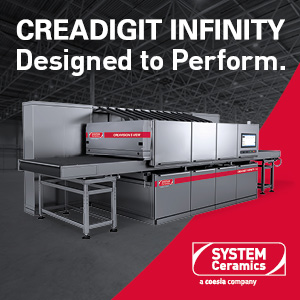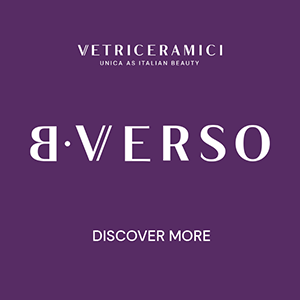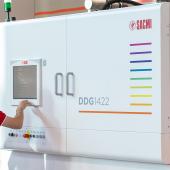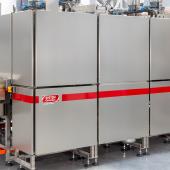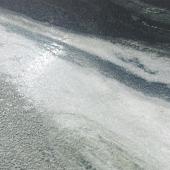Full Digital from Esmalglass-Itaca, the water-based solution for a fully digital process
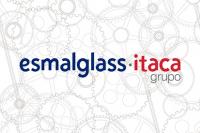
Ever since the first digital printer for ceramic tiles was introduced in 2000, the sector has undergone rapid, uninterrupted growth, leading to the digitalisation not just of the decoration stage but of the entire production process.
It is in this context that Esmalglass-Itaca is presenting its water-based Full Digital process at this year’s Cersaie, an innovative solution designed to make the process fully digital and suited to modern production lines equipped with digital printers.
The Full Digital process essentially involves using digital technology to apply the initial engobe, the effect ink decoration and the finishing glazes. A fully digital approach of this kind brings countless advantages: formulations with a lower water content and smaller weights compared to traditional applications, more uniform glaze applications (especially in the case of large size tiles with widths of 60 cm upwards), selective glazing synchronised with the graphic design, reduction in personnel costs and loss of material on the line, increase in quantity of first choice product, etc.
The decoration line digitalisation process was initially envisaged for large size tile production, which uses oil-based products suitable for existing printheads. These full digital production lines are being used with excellent results by large companies in Spain, Italy, Russia, etc.
If the applied quantities exceed certain limits, the application of glaze-engobe and the final oil-based covering may produce unpleasant odours at the kiln exit.
To solve this problem, Esmalglass-Itaca group proposes the use of water-based formulations for the initial engobe and the final glaze. The development of new high-discharge printheads designed specifically for water-based materials has allowed for the production of a full range of engobes and glazes for digital printers that bring further advantages with respect to those of a Full Digital process.
One of these is greater environmental sustainability. The use of water results in a significant reduction in atmospheric emissions and in odours caused by combustion, which in many cases are entirely eliminated. The olfactometric tests performed have given results of around 500 EOU (European Olfactor Units), almost 6 times lower than the levels established by the European standards (3,000 EOU) as not causing discomfort to humans.
The water-based Full Digital process formulated by Esmalglass-Itaca is ideal for all sizes and types of product.
The company began studying these products in 2011, the year in which it won the Alfa de Oro award for producing the first tile in an entirely digital process. The process was patented that same year.
Did you find this article useful?
Join the CWW community to receive the most important news from the global ceramic industry every two weeks







